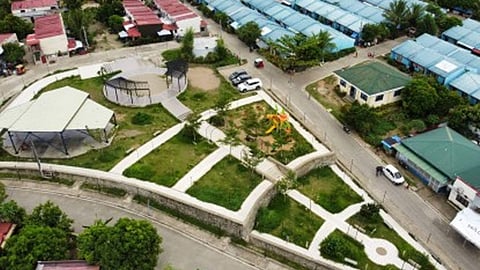Polluted creek sparks Tacloban cholera outbreak
PALO, Leyte — The Tacloban City Health Office has identified a polluted creek and a deep well that were made as the source of household water in at least three relocation sites for people displaced by typhoon Yolanda as the reason for the cholera outbreak in the city.
The outbreak has already killed four people, according to authorities.
TCHO chief Dr. Danilo Ecarma said that quality testing in Barangay 106 on raw water at the source, the processed water and on the pipes leading to households was found positive of total coliform and Escherichia coli or E. Coli, a bacteria found in the environment, foods and intestines of people and animals.
Ecarma said bottled water in a water refilling station found inside the village was likewise tested positive of both total coliform and E.Coli.
"We have concluded that the problem started at the water processing plant," Ecarma said.
The water in the village is provided by Cebu-based Mactan Rock Industries, Inc., which won in a competitive bidding last October 2018 to extend water distribution pipes to the city's northern villages, develop new water sources, set up and repair old pumping stations, set up a new reservoir and rehabilitate the existing reservoir.
The company sources its water from the creek at the back of the housing village and a deep well in its compound to supply its water subscribers, but since it started supplying water to households in 2019, the company has been the subject of complaints by many residents due to oftentimes murky and smelly water that drops from the faucets and absence of water service during summer.
Ecarma said no sanitary permit has ever been issued to the company since it started its operation due to its failure to submit to a regular water quality testing. Despite the absence of a sanitary permit, the company continued with an unhampered operation.
"We have been demanding from them to submit a water quality testing result but unfortunately they could not comply so no sanitary permit was issued," Ecarma said.
Barangay 106, one of the most populous villages in the city with an estimated population of 17,000, is the site of four housing projects as records from the City Housing and Community Development Office shows that GMA Kapuso Foundation constructed 398 houses, Habitat for Humanity with 560 housing units, Philippine Institute of Civil Engineers with 28 units and Global Medic 16 units.
The village also has 72 core shelters that are occupied with residents.
The city government has no data as to how many of the households are getting their water from Mactan Rock Industries.
"This is a big population and hindi pwede na wala silang tubig," Ecarma said when asked why the company was not closed despite not having a sanitary permit.
On Wednesday evening, the TCHO and the City Disaster Risk Reduction and Management Office have cut the water supply to the village to control the further spread of the bacteria. It also padlocked the Mactan Rock Industries and the water refilling station where cholera-causing bacteria were found among its products.
Tacloban City Mayor Alfred Romualdez has directed the CDRRMO and the Leyte Metropolitan Water District-Prime Water to regularly deliver potable water to the village until the problem is resolved.
CDRRMO chief Ildebrando Bernadas said the mayor also approved the recommendation to set-up checkpoints on the roads leading to Barangay 106 to monitor deliveries of water to the village and be able to get samples of water for quality testing.


